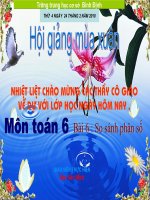bai so sanh
Bạn đang xem bản rút gọn của tài liệu. Xem và tải ngay bản đầy đủ của tài liệu tại đây (46.5 KB, 3 trang )
A Writing tes t Period 36
Date of teaching: 22/11/2007
I. Aim.
Check Ss' kowlege after 3 Units.
II. Objectives.
Check Ss' kowlege after 3 Units.
.III. Materials
Writing test papers
IV. Procedure.
I. Listening to the passage and fill in the gaps with the words
you hear
Camping (1)................. are always popular with students and young people- they are a trip and
easy way to see a (2)..................... People often travel by train, by coach or on foot, so one thing
is (3)........................to remember before starting : you can only take with you what you can
carry- usually a rucksack on your(4)............................
If you travel with a (5)........................., of course some items can be shared – a tent, a gas
stove, food. Other things must be taken by each person- clothes, (6)..............................., a
sleeping bag.
Many people who go camping for the first time take too much and then find they have forgotten
the (7).......................- a tin of bean is no good without a tin opener! But with practice and good
(8)........................you can have a fantastic holiday.
II. grammar and vocabulary
A. Pick out the word whose underlined part is pronounced differently from that of the rest
by circling the corresponding letter a, b, c or d.
1a. prefer b. perfect c. nerve d. discover
2.a. fully b. handful c. truly d. pull
B. Choose the correct options to complete the following sentences:
1. Bobby ............ for this factory for five years now.
a. works b. have worked c. has worked d. worked
2. They lost the key yesterday but it ........................
a. has already found b. was found already c. found already d. has already
been found
3. Hanoi,.........................is the capital of Vietnam, is very beautiful.
a. that b. which c. of which d. where
4. The ........... are those who don’t have a job.
a. injured b. rich c. disabled d. unemployed
5. Some people have been attacked in this area recently, ...................... is very worrying.
a. which b. what c. that d. who
6. The baby doesn’t cry so much now but she ....................... every night before.
a. use to crying b. used to cry c. is used for crying d. get used to
crying
7. I go to bed late so I .....................up early.
a. am not used to getting b. not used to get c. am not use to getting d. not used to getting
8. This book ................. from 3 p.m today.
a. have read b. reads c. has been read d. have been read
9. I.................. my bedroom this weekend.
a. am going to paint b. paint c. painting d. will
paint
10. What............... this evening?
a. will you do b. are you doing c. have you done d. did you do
III. Reading
A. Choose the best answer to complete the passage
Computers are helpful... (1)... many ways. First, they are fast. They can work with information...
(2)... more quickly than a person. Second, computers can work with ... (3)... information at the
same time. Third, they can... (4)... for a long time. They don’t forget things the common people
do. Also, computers are... (5)... always correct. They are not perfect, of course, but they usually
don’t make mistakes.
1a. in b. by c. through d. on
2a. hardly b. even c. wholly d. entirely
3a. a lot b. a lot of c. plenty d. much of
4a. stay b. remain c. hold d. keep
5a. most b. mostly c. almost d. hardly
B. Read this passage and choose the best answer
The second half of the twentieth century saw more changes in technology than in previous two
hundred years. Penicillin has already been discovered and used to treat infections. There have
been many remarkable advances in medicine that have helped to increase our average life
expectancy way beyond that of our ancestors. Incredible innovations such as television have
changed the way we spend our leisure hours. Perhaps, the most important break through,
however, has been the microchip. Nobody could have imagined, when it was first invented, that
within a matter of years. This tiny piece of silicon and circuitry would be found in almost every
household object from the kettle to the video recorder. And nobody could have predicted the
sudden proliferation of computers that would completely change our lives, allowing us to access
information from the other side of world via the internet or send massages around the world by
email at the touch of a button. Meanwhile, research into other aspects of information technology
is making it easier and cheaper for us to talk to friends and relation around the world.
1. What period saw more changes in technology than in previous 2 hundred years?
a. 1950- 2000 b. 1850- 1900 c. 1759- 1800 d.
1650- 1700
2. What does the word “infectious“ mean?
a. diseases b. good things c. computers d. technology
3. Which of the following can“t the computer help us?
a. access information b. cook meal c. do homework d. send messages
4. Which of the following doesn“t belong to household objects?
a. kettle b. electric cooker c. video camcorder d. blackboard
5. According to the passage, how is it to send an email?
a. difficult b. simple c. complex d. hard









